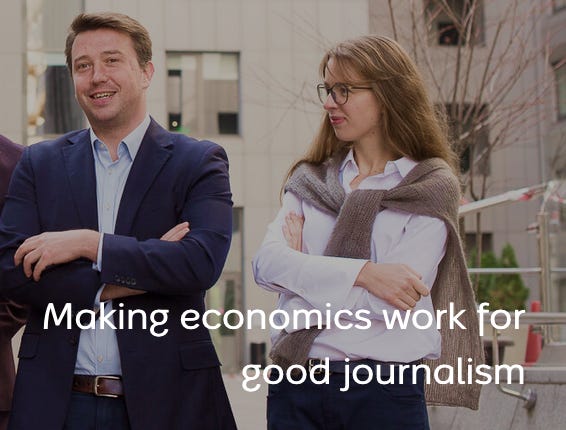Media lessons from Ukraine: people pay for trustworthy news
Innovative publisher sees business opportunity in region that traditional media avoid
You’re reading the Your News Biz newsletter. My goal is to help digital media entrepreneurs find viable business models.

This is a story of a media innovator in Eastern Europe named Jakub Parusinski and what he sees as the future of independent media around the world. I’ve written about him and his projects before here and here.
When I interviewed Parusinski four years ago, he said his goal was to become become “the McKinsey & Co.” of media consulting in Ukraine and Eastern Europe. Where other investors and entrepreneurs saw risk — press freedom under threat from authoritarian governments, financial decline, layoffs — he saw opportunity.
All of the problems of independent media in the region, he said, were simply because they needed more money.
He has since built on that vision and insight. He has degrees in business and economics from universities in France and experience as a columnist for the Financial Times and the Kyiv Post, where he later became editor and CEO. (He lists French, English, and Polish as his native languages, plus “full professional proficiency” in Russian.)
Fired and censored
Step 1. In 2019, he and several others founded Jnomics Media, a media consultancy “that aims to prove that media can be both mission-driven and profitable.”
Step 2. He was among the journalists fired by the Kyiv Post for criticizing Ukrainian authorities. They turned around and launched the Kyiv Independent news organization in 2021, just three months before the Russian invasion.
Step 3. These days Parusinski is editor of a $200-a-month newsletter, KI Insights, which aims to “provide subscribers with an inside perspective on Ukraine’s political and economic developments — and the country’s road to reconstruction.”
An independent media voice in Ukraine
The funding model of the Kyiv Independent shows dramatically how a media organization can survive and produce valuable news and information under extremely trying conditions — power outages, missile and drone strikes, battlefield coverage.
Reader supported. The 60-person Independent receives most of its funding from 19,500 readers who contribute on a monthly or yearly basis. Other sources include one-time donations, an online store, content syndication, and advertising. “In this way, we can ensure that we serve our readers and community, and nobody else,” their website declares.
Readers who provide recurring financial support are called members of the Kyiv Independent. “Most give $5 a month — and thanks to their contributions, we are able to fund our operations and reach millions of readers around the world every week. Membership shows just how powerful collective action can be.”
The road ahead
Because of all this, I was interested in Parusinski’s takeaways from the International Journalism Festival in Perugia, Italy, in April. He had some pointed observations and criticisms of journalism funding models. And yet, “despite the doom and gloom” caused by funding cuts to media development organizations, he said, “I left the festival more optimistic than I arrived – mainly because of some of the less obvious ways in which the industry has changed.”
Parusinski sees lots of inefficiencies in the way journalism aid organizations have invested. Some of his reflections after Perugia:
The “brutal funding cuts” to media development foundations and NGOs like USAID and NED affected those organizations more than the news outlets.
A lot of foundation money was eaten up in their bureaucracies and never reached journalism organizations anyway.
The current donor-supported media ecosystem will be unable to sustain itself, he believes. New funding models will have to emerge.
News media that embrace technological and funding changes will survive; those hoping for a return to “normal” won’t.
“The media space might look quite different in 2026, perhaps featuring more content producers that don’t resemble traditional publishers.” Data and tech companies, for example.
News consumers will still have lots of quality news content, but maybe at a higher price.
This Perugia festival had more small software and tech solution providers for publishers than in previous years — not just the big tech players — which Parusinski sees as promising.
+++
Final thought: trust has economic value
Anyone who identifies themselves these days as a journalist hears some version of the following: The media can’t be trusted, they’re biased, they’re sensationalistic, they depress me, I avoid the news, I hate the media.
Do I need to go on?
They readers are absolutely right, of course. What gets fed to most of us through mainstream and social media — cable news, broadcast networks, and our echo chambers — is often trying to persuade us rather than inform us. The algorithm-driven news menu emphasizes what the shouters from the extremes have to say because that’s what gets attention.
In our attention economy, the economic value of any information product is based on how much time and attention the public gives it. Every business wants it. Their public relations people want it. Advertisers want it.
The lesson from Ukraine is that trustworthy news and information also has economic value. In economic terms, there is an oversupply of junk in the media ecosystem, and a shortage of trustworthy news and information. That makes it more valuable.
People will pay for information from news sources that
1) are relevant to their daily lives
2) offer solutions to the problems they face in their daily lives
3) have proven themselves trustworthy over time. How do they do that? Admitting mistakes and how they happened. Being transparent about their ownership and finances. Explaining complex issues.
Jnomics, the Kyiv Independent, and KI Insights have all been thriving in the face of seemingly impossible working conditions. That should give us all some reasons for optimism.
Previously:
Four reasons for optimism, Librarians and data geeks strike fear in the hearts of autocratic bullies
Free speech playbook: How news media are refusing to be silenced




